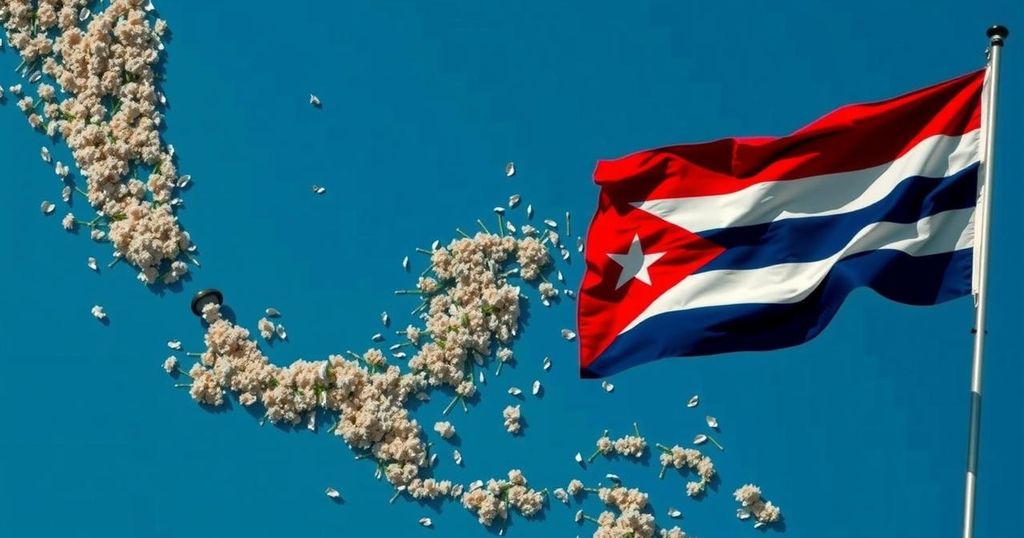Global news
AMERICAS, ANDRES MANUEL LOPEZ OBRADOR, ANDRÉS MANUEL LÓPEZ OBRADOR, ASIA, CLAUDIA SHEINBAUM, CUBA, DIPLOMATIC RELATIONS, HUGO CHAVEZ, INTERNATIONAL RELATIONS, MEXICO, NICARAGUA, NORTH AMERICA, PHILIPPINES, SANCTIONS, SHE, SHEINBAUM, SOUTH AMERICA, SOVIET UNION, TRADE RELATIONS, VENEZUELA
Jamal Walker
0 Comments
Mexico’s Alarming Support for Cuba’s Dictatorship
Mexico has recently increased its support for Cuba’s communist regime, assuming a role reminiscent of historical backers like Russia and Venezuela. Under President Claudia Sheinbaum, Mexico has escalated its supply of resources to Cuba despite significant internal strife and violence. The alignment raises complex moral and political questions regarding the impact on both Mexican citizens and the Cuban populace suffering under a repressive dictatorship, highlighting a troubling disregard for democratic principles and human rights.
In recent years, Mexico has increasingly positioned itself as a crucial ally to Cuba’s enduring communist regime, drawing comparisons to historical supporters such as Russia and Venezuela. Following decades of financial and material assistance from the Soviet Union and later from Hugo Chavez’s Venezuela—amounting to tens of billions of dollars—Mexico has taken on the role of Cuba’s primary benefactor in the contemporary era. Despite grappling with its own surge in violence, characterized by bombings, murders, and organized crime—most notably in regions such as Sinaloa—Mexico’s current administration, under President Claudia Sheinbaum, has prioritized supporting Havana above addressing domestic issues. In an alarming shift, Mexico’s commitments to Cuba have escalated to unprecedented levels, with President Andrés Manuel López Obrador pledging record amounts of oil and other resources. In 2023, Mexico’s supply of 5.4 million barrels of oil to Cuba, valued at approximately $391 million, stands as a staggering gesture of solidarity towards a regime known for its oppressive practices and lack of democratic freedoms. This assistance occurs despite Cuba’s notorious human rights record, including the detention of 1,100 political prisoners. Amid Cuba’s deepening economic crises, exacerbated by systematic mismanagement and corruption, Mexican support fails to address the root conditions of the Cuban populace’s suffering. The Cuban government continues to misallocate resources while using medical professionals as pawns for oil payments to Venezuela, raising concerns about a parallel arrangement with Mexico. The moral implications of Mexico’s extensive support for Cuba are particularly troubling. As Mexican citizens confront significant infrastructural challenges, including one of the largest blackouts in its history, it raises fundamental questions regarding the government’s priorities. Conditions in Mexico eerily reflect those prior to Venezuela’s fall, suggesting a troubling trajectory for the Mexican state. Rather than conditioning support on reforms and basic human rights assurances, the Mexican government appears aligned with the dictatorial regime in Havana. Such actions undermine not only Mexico’s democratic foundations but also the prospects for genuine support to the Cuban people who continue to suffer under an autocratic government.
This article discusses Mexico’s evolving relationship with Cuba’s communist government, particularly focusing on recent developments wherein Mexico has shifted from a supportive stance to being a significant provider of resources. The historical context highlights the longstanding alliances between Cuba and various nations, primarily the Soviet Union and Venezuela, and how the political dynamics have today placed Mexico in a position of providing crucial support despite internal crises. The article underscores the complexity of international relations, the moral implications of support for dictatorial regimes, and the consequences of governmental policies on both domestic and foreign fronts.
In conclusion, Mexico’s recent actions signify a troubling alignment with Cuba’s oppressive regime, raising alarm over its implications for both Mexican democracy and the well-being of the Cuban people. The focus on supporting a dictatorship while neglecting critical domestic issues exposes a concerning trend that prioritizes geopolitical solidarity over human rights and democratic values. It is crucial for Mexico to reassess its foreign policy approach to ensure that it promotes not just aid but also accountability and reform for the benefit of oppressed populations.
Original Source: thehill.com




Post Comment